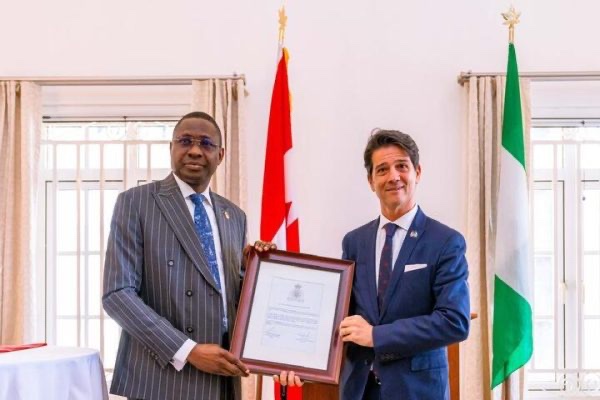
Canada Honours EFCC Chairman Olukoyede for Outstanding Role in Global Crime Fight

In a resounding recognition of his tireless efforts in the global war against financial crimes, Canada has bestowed a prestigious honour on Ola Olukoyede, the Chairman of Nigeria’s Economic and Financial Crimes Commission (EFCC). The accolade, delivered with ceremony and distinction, affirms Olukoyede’s growing influence and unwavering commitment to dismantling transnational crime networks that threaten the economic and social stability of nations across the globe.
The honour was conferred on Olukoyede in Ottawa, the capital of Canada, where high-level dignitaries, law enforcement leaders, and diplomats gathered to witness the moment. The Canadian government, through its Ministry of Public Safety and the Royal Canadian Mounted Police (RCMP), praised Olukoyede’s bold leadership, strategic reforms, and collaborative efforts that have not only transformed Nigeria’s anti-graft landscape but have also yielded measurable results in the disruption of global financial crime syndicates.
Canadian officials highlighted Olukoyede’s instrumental role in spearheading cross-border investigations, coordinating intelligence-sharing frameworks, and elevating Nigeria’s profile as a committed partner in the global anti-corruption movement. His leadership, they said, represents a rare blend of professional integrity, legal acumen, and an unyielding resolve to hold the corrupt accountable, no matter how powerful.
In his acceptance speech, Olukoyede expressed deep gratitude for the recognition, attributing it to the collective work of the EFCC and Nigeria’s unrelenting quest for a transparent society governed by the rule of law. “This honour is not just for me, but for Nigeria,” he said, visibly moved. “It reinforces the fact that the world is watching our efforts, and it motivates us to do more in protecting not just our economy but the integrity of the international financial system.”
The Canadian government commended Nigeria’s growing role in combating money laundering, cybercrime, illicit financial flows, and other forms of economic sabotage that thrive in complex, multi-jurisdictional environments. According to RCMP Commissioner Michael Duheme, Olukoyede has become “a key ally and an invaluable bridge in the global security architecture,” noting that under his stewardship, Nigeria has provided vital intelligence and operational support in some of the most sensitive and high-stakes international investigations.
The recognition comes amid increasing efforts by developed nations to deepen partnerships with African institutions in tackling crimes that no longer respect borders. Canada has, over the past few years, prioritized international cooperation as a cornerstone of its public safety strategy, especially in matters relating to financial integrity, cybersecurity, and organized crime. Olukoyede’s tenure, they noted, has redefined what global cooperation with African law enforcement can achieve.
Observers say the Canadian honour signifies a turning point in how Nigerian anti-corruption agencies are perceived on the global stage. Once viewed through a lens of skepticism and bureaucratic inefficiency, the EFCC under Olukoyede has been lauded for embracing transparency, digital innovation, and aggressive prosecution strategies that have led to landmark convictions and asset recoveries.
In recent months, EFCC’s crackdown on cybercriminals and high-profile financial fraud cases has not only earned domestic applause but has also attracted international admiration. Joint task forces involving Nigeria and Canada have reportedly dismantled several online fraud rings, traced illicit funds across continents, and frozen accounts tied to terrorism financing and organized theft. Olukoyede, as the chief architect of these collaborations, has consistently advocated for a global approach to crime fighting, arguing that no country can afford to act in isolation.
His track record, rooted in a career that spans law, policy, and institutional reform, has drawn commendations from across the globe. International agencies including INTERPOL, the FBI, and Europol have also acknowledged the EFCC’s renewed vigour, with Olukoyede often serving as a central figure in strategy sessions and roundtable negotiations.
Canada’s decision to honour him, insiders say, was not spontaneous. It followed months of bilateral engagements, intelligence assessments, and performance audits that placed Nigeria’s anti-corruption performance in a positive light. The Canadian Parliament reportedly reviewed reports from international watchdogs and enforcement bodies that cited a measurable decline in cyber scams linked to Nigerian-based networks—a decline many attribute to the EFCC’s aggressive campaigns and strategic partnerships.
Political analysts believe this development carries broader diplomatic significance. It signals Canada’s growing trust in Nigeria’s institutions and a subtle endorsement of President Bola Tinubu’s anti-corruption agenda. By honouring the EFCC chairman, Canada sends a message to the international community that Nigeria is no longer a passive participant but a frontline player in the fight against global financial crime.
Reactions from within Nigeria were swift and celebratory. Legal professionals, civil society groups, and government officials praised Olukoyede’s recognition as a moment of national pride. The Minister of Justice described the award as “a seal of approval on years of grit, courage, and consistent pursuit of justice.” Meanwhile, social media buzzed with congratulatory messages, with citizens urging the EFCC to keep the momentum and broaden its impact beyond arrests to systemic reforms.
The recognition has also sparked a renewed conversation about the importance of leadership in law enforcement institutions. Analysts say Olukoyede’s approach—marked by transparency, strategic communication, and public engagement—has restored credibility to the EFCC and inspired a new generation of anti-corruption advocates.
As the event in Ottawa drew to a close, Olukoyede held up the award, not as a personal trophy, but as a symbol of international solidarity in a world increasingly plagued by invisible enemies—money launderers, cybercriminals, and economic saboteurs. “This is a fight we must win,” he said. “Not just for Nigeria, but for every nation that believes in justice, accountability, and a future free from the shackles of corruption.”
Canada’s honour may have been directed at one man, but it stands as a tribute to what is possible when institutions rise above politics, when leaders embody integrity, and when nations come together to defend the ideals of justice. For Ola Olukoyede and the EFCC, it is both a milestone and a mandate: to keep pressing forward, to keep building trust, and to never relent in the war against crime—wherever it hides.


